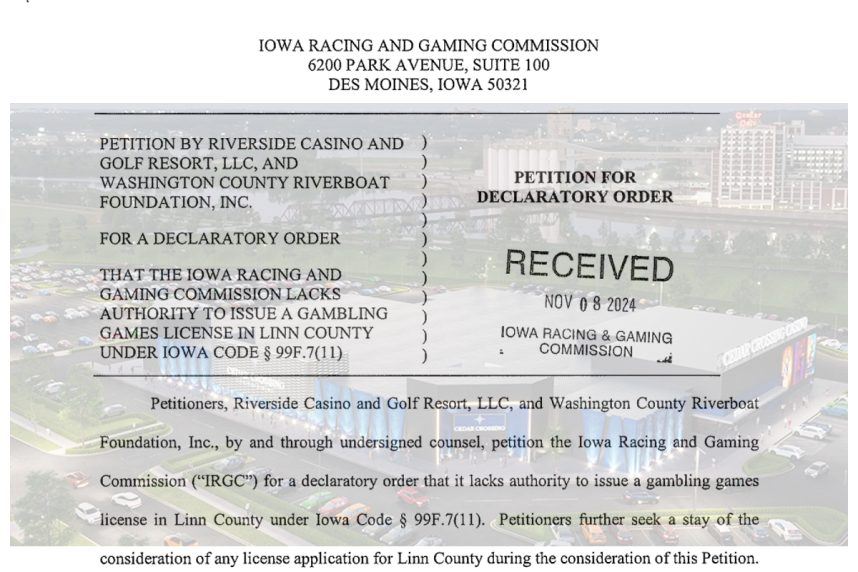Date: November 19, 2024, 12:16h.
Last Update: November 19, 2024, 12:16h.
A casino in Iowa has requested the state gaming agency to dismiss a recent application due to allegations that it is attempting to operate slot machines, table games, and sports betting in a county where gambling is not allowed.

Attorneys representing the Riverside Casino & Golf Resort have asked the Iowa Racing and Gaming Commission (IRGC) to halt its review of a casino proposal for Cedar Rapids. Lawyers for Riverside argue that the Linn County gaming referendum in 2021 did not authorize gambling but extended gaming provisions from a previous referendum in 2013.
As there are currently no gambling facilities in Linn County, Riverside challenges the significance of the 2021 vote. The referendum asked voters if they wanted to approve the “operation of gambling games” … to “continue,” with the assumption that the county would qualify for a casino if approved by the IRGC.
The petition from Riverside Casino argues that since there have never been licensed gambling games in Linn County, the proposition to approve the continuation of games does not authorize the initiation of gambling operations in the county.
“A proposition requiring approval or defeat of the continuation of gambling games does not authorize the establishment of gambling games in the county,” the petition continued.
Riverside Seeks to Protect Customer Base
Riverside Casino, located approximately 30 miles south of Cedar Rapids, is concerned about a potential new competitor in the form of Cedar Crossing, a planned $275 million resort casino. The development group behind Cedar Crossing includes the Linn County Gaming Association and Peninsula Pacific Entertainment (P2E), a casino company based in Los Angeles.
Lawmakers and regulators in Iowa have hesitated to grant gaming licenses to Linn County and Cedar Rapids due to concerns that a casino in the second-largest city in Iowa could draw players away from existing casinos. Riverside stands to be the most impacted by Cedar Crossing.
An impact study commissioned by P2E suggests that Cedar Crossing would increase Iowa’s annual gaming revenue by $80 million, but a significant portion of this revenue would come at the expense of existing casinos, with Riverside projected to experience an 11.6% drop in annual income.
Casino Project Details
The proposed Cedar Crossing Casino would feature 700 slot machines, 22 table games, and a sportsbook. Additionally, it would include a 1,500-seat concert hall, multiple restaurants and bars, and a STEM lab for families.
The project aims to create over 500 full-time jobs, with 8% of the casino’s gross revenue going to charitable programs through the Linn County Gaming Association. Iowa law mandates that at least 3% of gaming revenue from casinos must be directed to non-profits.
In addition to challenging the casino proposal, Elite Casino Resorts, the group behind Riverside Casino, has formed a political action committee called Iowans for Common Sense to oppose further casino expansion in Iowa. The mayor of Cedar Rapids, Tiffany O’Donnell, has criticized the influence of casinos on the gaming commission.
Mayor O’Donnell expressed concern about the funding behind the campaign against new casinos, stating that it goes against the will of Linn County voters. She believes residents see through these tactics and hopes the Iowa Racing and Gaming Commission will as well.
Several state lawmakers support placing a moratorium on the issuance of new gaming licenses by the IRGC. Legislation for this moratorium is expected to be introduced when the Iowa Legislature meets in January. The IRGC is set to make a decision on the Cedar Crossing Casino on Feb. 6, potentially necessitating quick action from lawmakers to prevent its approval.
If the IRGC approves Cedar Rapids Development Group’s license before the moratorium takes effect, the project would be exempt from the new law.


